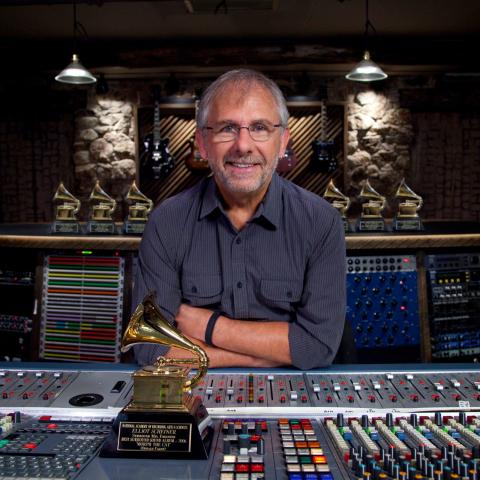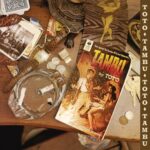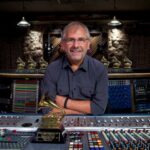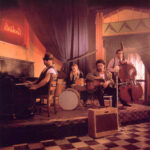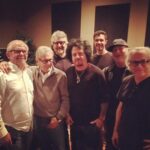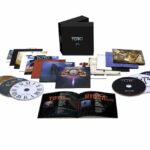The Tambu album was Toto’s first studio album after the death of their drummer Jeff Porcaro. So I wanted to talk about this important turning point in the band’s discography in the mid-90s. Elliot Scheiner, producer and sound engineer of this record, was the ideal witness to evoke this subject, not without exchanging on his following works with the band, including the Mindfields album which marked the return of singer Bobby Kimball. Let’s meet with a great technician with an impressive discography who contributed to the history of Toto!
How did you start a passion for music, and eventually made a career of it?
Originally, I was a musician. I played as a young kid and at some point I played in bands when I was about 21 or 22 but prior to that, music ran in my family. My mother was a part-time musician and my uncle was a pretty famous trombone player who played with the Benny Goodman Band for quite a few years. Once, he was in a studio playing and he introduced me to a guy named Phil Ramone who had a studio in New York called A & R. I wanted to get into the industry where I didn’t have to play an instrument. I met withPhil and it was a 10-minute conversation and he said : « Well, when can you start? » I said : « When do you want me to start? » And that’s how I got into recording.
In your discography, you are credited both as a producer and a sound engineer : how did you get that skillfulness?
In the early days, when I started, there were usually two people in the control room – the staff producer and the engineer. I was an engineer and you really tried not to cross those lines. But at some point, a lot of the bands said : « Why are we using both when we’re deciding what we think should be in production? Shouldn’t it just be the engineer? » That’s how they got rid of staff producers and they replaced them with engineers. There were new bands coming in and they were like : « Well, we need help here – what do you think we should do? » So you would become a producer but you didn’t get credit for it. I made it clear that if they wanted me to produce, I wanted to be paid as a producer. And that’s generally how it happened.
How did Toto get in touch with you to produce their Tambu album?
I did a lot of Steely Dan recordings and Jeff Porcaro was their drummer. When he left Steely to go play with Toto, he told me : « You know, I really want you to be in there. I would really like you to be the engineer. » But they were pretty much producing by themselves and they were so talented that they really didn’t need a producer. Years went by and I continued to work with Jeff on different levels, and when Jeff died, I got a call from Luke (Steve Lukather). He said : « You know, through the longest time, Jeffrey was always saying that we should use you, we should have you as our engineer and producer. Now, we want to do this and we want to know if you’re interested in doing it. » So I said : « Oh, yeah, of course! You guys are great, it’s a great band and I would love to do this! » So he conferred with David Paich and David was into it as well. The other guys in the band at that point were literally replacements. Mike Porcaro played bass but he wasn’t there at the beginning. Same thing with Simon Philips, and Steve Porcaro and Bobby Kimball weren’t there for Tambu either, so basically it was David Paich and Steve Lukather who made the decisions. That’s how we got to work together.
What were the expectations of each member of the band regarding your role both as a producer and a sound engineer?
I don’t think they had any expectations in particular. Mike Porcaro had come in to replace David Hungate. Steve Porcaro, was no longer with the band as he was scoring movies, would come into the studio to help out on certain tracks. When I came in on the first day, Mike was very happy to see me, and so was Simon. We all got along great and the sense of humor between myself and these guys was terrific! We had a great time making the record and we would go out to dinner together every night – it was amazing!
The whole Toto band is credited for production work along with yourself. How did you all agree on the numerous artistic choices to make, considering each of them has a strong and different personality?
It was bygeneral consensus. With Simon, it was how he wanted the drums to sound. He would bring inhis own mikes and tuned his drums specifically for those mikes. He said : « It might not be what you’re accustomed to but that’s how I want them. » It wasn’t a problem for me. Mike said : « Just record my bass like anybody else. » Same thing with David, except for the piano that he wanted to sound a certain way. Steve had three amplifiers – two of them had sound effects on them and one amp was flat. So when it came to what the guys were playing, when they were going to play, that was general consensus. Everything else going on like horns or strings, that was pretty much David. His father was a phenomenal arranger and he actually did some stuff for us and that was great!
When it came down to vocals, nobody showed up – that was only me and Steve Lukather. We would spend from about 2 in the afternoon until midnight doing vocals and usually just on one song. We arrived at the same opinion of what the vocals should be and Steve would listen to it and say : « What do you think of that? » So I would point out something that I didn’t like and he would sing it again, but generally Luke and I were always in the same frame of mind about what the vocals should sound like.
There is a very melancholic atmosphere on this album, considering the fact that it was made after Jeff Porcaro’s passing. Could you feel it during the studio sessions as well?
Well, I hadn’t seen these guys since Jeffrey’s funeral where there were about 3,000 people, so I didn’t say much about anything on that day. I would speak to people who were in the same mode as I, who knew him. I remember I came across Jackson Browne and he was talking about Jeffrey and how he changed his life and what difference he made…
We got in the studio afterit all settled down but this was quite a few years later, actually. Jeffrey died in 1992 and we didn’t start until 1995 on Tambu so it was quite a few years down the line. There wasn’t much said about it – I mean, there would references, mostly by Steve Lukather. He would say things like: « If Jeffrey were here, this is the way he would do it. » But to me, personally, it didn’t feel melancholy.
Tambu is also a special album in Toto’s discography through the presence of backup singers Jenny Douglas and John James. How did they become so important to the point of singing as lead singers as well and bringing funky sounds to the record?
Jenny and John were doing songs on the sets that nobody else wanted to sing. So te band thought these guys would be great and they wanted to give them more of a lead role. You know, when you go to see Toto on stage, they still have a background part. Steve and David felt like they wanted to do something nice. I remember doing the vocals and they were always separate from Steve’s. I feel Jenny and John did it just out of friendship.
You were later involved on the Toto XX album, mixing unreleased tracks, and then again on the following album entitled Mindfields. Was it planned from the beginning that you would collaborate with Toto on several projects?
No, it wasn’t. They loved the way Tambu came out and they just wanted to continue on those lines. We became really great friends and to this day, Steve and I are still best friends.
By the time we finished Tambu, I went to Europe with them.We went to England and France and the Netherlands…We talked about doing Mindfieldsand we ended up doing it together. We also did Livefields whichwe recorded in France!
Yes, Steve Lukather can be heard saying « Bonsoir, Marseille ! » at the end of the song « Tale Of A Man » and just before they start « Rosanna » on Livefields! Regarding Mindfields, how did you experience the reunion between Bobby Kimball and the members of Toto in the studio?
Well, that was kind of new to me and also that wasn’t planned. They had lost so many guys that I think they were just trying to make it a little bit more of the original band. They wanted Bobby’s voice – they wanted to hear him sing and they were also thinking about touring. Regarding some of the songs he sang, it would be better if Bobby was here.
Steve Lukather had then become the lead singer for a few years. Would you know why Bobby Kimball eventually came back on Mindfields? How did they decide who would perform the lead singing on some song or another?
While they were on tour, Steve had to sing every song – well, that was a lot of work for him! The only song David sang was « Africa » so Steve was carrying the load… When Bobby came back, they tried to make it good and everybody was trying to make everything work out but they each had different opinions. They resented the fact that Bobby was going out on his own on the road implying that he was the singer from Toto.
Toto’s members have a reputation for having been much recommended musicians by many artists for studio sessions. From what you know of this domain and your collaboration with them, how would you explain it?
Well, everybody loved the way Steve played, same thing with Jeffrey and David Paich. These guys had a lot of soul to what they played. They were also great songwriters. Steve Porcaro wrote Human Nature. That was a huge record for Michael Jackson. They were well known both for playing and writing songs. People would call them just to find out what songs they had written that they were not doing themselves and that they would be willing to let another band or singer do. So they were always around!
In 2018 , you worked with the band again to remaster all their albums released by Sony in a box set. Can you tell us about the behind the scenes of this project, please?
I was there in mastering with David Paich, Steve Lukather and Steve Porcaro. They just wanted to make everything sound as best as it could, and trying to make it so that all the albums were similar to what they sounded like. We spent a good 7 days in the mastering room. I picked Gavin Lursson – the mastering engineer that I wanted to use – and he was excited to do this. Steve and David were happy to have him since they knew him from some other place. So we did the whole thing. The A&R guy from Sony showed up and stayed there on sessions. It was all very comfortable.
You have a very impressive discography and we could have discussed many other artists, but where does Toto stand among them to you?
Well, they’re at the top like everyone else that I have worked with! I generally don’t get into saying « Oh, this band is better ! » When they get to that level and they have accomplished what they do, they’re all number one to me!
